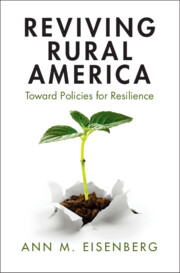Book contents
- Reviving Rural America
- Reviving Rural America
- Copyright page
- Contents
- Figures
- Acknowledgments
- 1 Introduction
- 2 The Foundational Myths
- 3 The Myth of Rural Empowerment
- 4 The Myth of Rural Unsustainability
- 5 The Myth of Rural Decline
- 6 The Myth of Rural Radicalism
- 7 The Myth of Rural Whiteness
- 8 The Myth of Rural Obsolescence
- Index
2 - The Foundational Myths
The Myths of Rural Hyper-Simplicity, Rural Hyper-Complexity, and Rural Immateriality
Published online by Cambridge University Press: aN Invalid Date NaN
- Reviving Rural America
- Reviving Rural America
- Copyright page
- Contents
- Figures
- Acknowledgments
- 1 Introduction
- 2 The Foundational Myths
- 3 The Myth of Rural Empowerment
- 4 The Myth of Rural Unsustainability
- 5 The Myth of Rural Decline
- 6 The Myth of Rural Radicalism
- 7 The Myth of Rural Whiteness
- 8 The Myth of Rural Obsolescence
- Index
Summary
Inquiries into rural conditions are sometimes viewed as not worth pursuing in the first place. This chapter takes on “foundational myths,” or assumptions that make “rural” seem uncompelling as an investigative lens. The myth of rural hyper-simplicity suggests that rural challenges can be solved with easy, one-size-fits-all interventions, such as rural residents relocating. Conversely, the myth of rural hyper-complexity suggests that the rural United States is so vast and diverse that to pursue analyses beyond specific regions is an exercise in futility. Finally, the myth of rural immateriality suggests that “rural” is not an interesting or relevant lens, as other analytical frames (such as a population’s race or national origin) are more explanatory. The chapter addresses these myths by offering a definition of “rural” that incorporates intersectionality theory, highlights common challenges associated with population sparseness and remoteness from urban centers, and reveals rurality’s salience to law. This chapter introduces the concept of “urbanormativity,” or the treatment of rural conditions as deviant or incomprehensible. The chapter summarizes scholarly explorations of urbanormitivity in rural sociology and law and rurality. It seeks to establish that rural conditions are complex, but they have common themes that are capable and worthy of being understood and addressed.
Keywords
- Type
- Chapter
- Information
- Reviving Rural AmericaToward Policies for Resilience, pp. 24 - 46Publisher: Cambridge University PressPrint publication year: 2024



